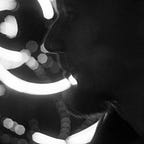The Song of Dead Stars
So first, she sent me this video:
And then we said:
I like the idea of future people writing myths about the Time of Stars
>> yeah, that part gave me chills
though I suspect they will no longer be perceiving primarily with visible light so I wonder how they’ll talk about it
“the stars smelled of magnetism” “how is that even possible? These ancient texts are so mystical”
>> now I have new reasons to be sad about my own mortality
>> because I want to hear those myths
I’ll write one for you.
— — —
“You do not remember the Stars.
They were gone long before you were born. But I was there, and I remember.
The Stars were like our worlds, but ones you could not visit, as they sang a constant song of heat and electromagnetism, so loud you could hear nothing else if you were too near. They were massive, and brilliant, and innumerable. Each world had a Star that it was locked with, like two lovers locked in a dance. When your side of your planet faced your star, it was called Day, and the light flowed everywhere, into every hidden space. Every surface glowed with it, it was like swimming in an ocean of light. And when the planet turned away from your star, it was called Night, and millions upon millions of farther stars hung in the air, their light tentative but constant. They shone across the sky like the pricking of a million blades of grass across your skin, if you could be able to lay across a whole field all at once. There was never a time without light.
That was the strangest thing about those times. There was light, everywhere, always. Eyes were essential, not the choice that they are today. We were so entranced by that little fragment of the electromagnetic spectrum, it took us millions of lifetimes to even realize there were others.
Now, of course, you know which way the poles of a world are, like they are a distant extension of your body. In the time of the Stars, we spoke of “people” and “machines” as though they were different things, and you needed machines to know electromagnetism beyond light. Because of the light, though, you could know where everything around you was, just by seeing it. But, because light is fickle and runs away from matter, you couldn’t see things that were behind other things. I know this is strange to you, but can you imagine not being able to know where your mate is, simply because there is stone between you? You would have to move around the stone to know them, unless they called out or you heard them moving. Solid objects seemed more real, somehow, than non-solid ones, in those times. We understood that fields were real, but most of us didn’t quite _believe_ it, in the same way we believed in the realness of matter. Despite knowing there was no difference, light fooled us into thinking matter meant more.
And then, as we lived longer and longer, the universe got older, and the Stars went out, one by one. They all collapsed under the weight of their own brilliance, their corpses turned under the soil of the universe, to feed what came after. They broke down into elements, which we use to build, and black holes, which we use to power what we build. We learned how to live without them. Now, we think of that time as before civilization, before the true science that we know today.
I know, it sounds like a barbaric time, but the light was so beautiful. And there was such joy in discovering things. Imagine, not knowing where your mate was, and then, just moving a little bit, and suddenly, there they were, like magic! Imagine, not knowing where all the flowers in the field were by their smell and their electromagnetic song, and then just coming upon one, like a gift from no one in particular. The light careened off of moons and buildings and decay and flowers and the faces of those we loved, caressing everything without regard or care for anyone’s notions of beauty or morality. Utterly free. The light knew us all, and was kind.
Yes, we knew so much less of the world, then. Our senses have expanded beyond anything we once knew, our bodies would not even be recognized as bodies by those of us then. We’ve become something other than what we were, and it is folly to think the past somehow better than the future, or even the present. We are now what we are, and the universe is what it is, and we should not want to trade our present knowledge for some golden vision of the past. But, because of the limitations of our perceptions, then, in the time of Stars there were constant, fantastic moments of magic.
And the light was so beautiful.”
